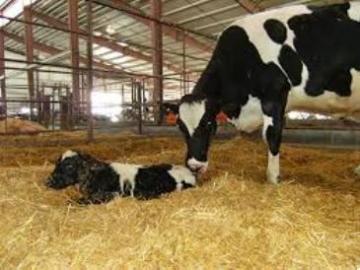
The golden hour: The first hour after calving is the most critical period in the entire life of new born calf.
IMPORTANT POINTS TO REMEMBER
- Clean nostrils and mouth which helps the calf breathe better and help prevent future breathing problems.
- Allow the mother to lick the calf clean which promotes circulation within the calf’s body and prepares the calf to stand up and walk.
- Tie the naval cord with a thread at a distance of around
- 2 inches from the base and cut the remaining cord with a clean instrument.
- Dip the navel (a simple smearing will not serve the purpose) in 7% or higher tincture of iodine solution and repeat after 12 hours. (Do not use teat dip or weaker iodine solutions). A poorly maintained navel is the gateway to serious infections.
- A new born calf should be given 2 litres of colostrum within the first 2 hours of birth and 1-2 litres (based on size) within 12 hours of birth.
- Many calves do not nurse adequate amounts of colostrum from their dams within the first few hours of life, and thus they may not receive adequate immunity.
- Feeding colostrum after 24 hours of birth may not help the calf to ward off infections.
- A calf must receive adequate colostrum to protect it from diseases for the first three months of its life. Colostrum is the calf’s “passport to life”.
- Hand-feeding new-born calves is therefore recommended so that the farmer is sure about the amount of colostrum an individual calf receives.
- De-worming should be done within 10-14 days of age subsequently on a monthly basis up to the 6th month.
- When the animal is 3 months old, contact the veterinarian for vaccination.
- Provide calf starter from 2-8 weeks for better growth and early maturity.
Example of a simple calf starter (approx. percentages)
Maize-52 % ; Oats -20 % ; Soya bean meal -20 %; Molasses -5 %;
Salt -0.5 % ; Minerals (Macro & Micro) -1.5%; Vitamins -1%
Timely care of new-born calf will ensure its survival
